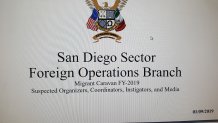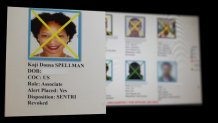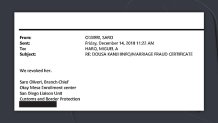When a large migrant caravan approached the border in Tijuana in late 2018, the U.S. government started tracking the movements of some Americans suspected of having connections to the caravan – including journalists, attorneys, aid workers and even clergy members.
A lawsuit filed by a pastor who was targeted as part of this controversial surveillance program is shedding new light on how it all played out.
Depositions taken in the lawsuit filed by Pastor Kaji Douša are allowing us, for the first time, to hear directly from a U.S. Customs and Border Patrol officer directly involved in those controversial tactics.
CBP Officer Saro Oliveri testified he is the one who sent an email to the Mexican government in December 2018, asking them to deny entry to 24 people, including Pastor Douša and 13 other Americans. He called the request “unusual.”
“We were requesting for them to deny entry so that once they turned around we would be able to interview them,” Oliveri said during his deposition.
The email claimed there was a large possibility the people on the list did not have documentation to be or remain in Mexico. Oliveri testified that someone with higher authority sent him the names, but he could not remember who that was. He said he and other CBP officers drafted the email per the request of the higher authority.
A report by the Office of the Inspector General for the Department of Homeland Security, released in September 2021, found that the email was sent “without genuine basis.”
Pastor Douša was one of the Americans named in that email to the Mexican government. She was also among dozens of people in a CBP PowerPoint about the migrant caravan of “Suspected Organizers, Coordinators, Instigators, and Media” that was leaked to NBC 7 Investigates in March 2019.

Douša’s face had a yellow X across it, with notes that an alert had been placed, and her SENTRI pass revoked.

Lawsuit Uncovers Conflicting Information from CBP
Douša is suing the U.S. government for interfering with her constitutional right to counsel and assist members of the migrant caravan. She says she traveled to Tijuana to pray with and counsel asylum seekers twice in November 2018. She returned in January 2019, and when she tried to re-enter the U.S. at the San Ysidro Point of Entry she was pulled aside for secondary screening. She says border patrol agents led her to a back room where she sat for hours until they questioned her about her work.
“I'm very confused why the Department of Homeland Security is wasting all these resources on a pastor like me,” Douša said.
In the years since NBC 7 broke this story, Douša says she has been fighting for answers and accountability.
“It's absolutely irresponsible for a government agent to reach out to a foreign government to ask them to apprehend a U.S. Citizen, a pastor, who's down there praying with people and offering blessings,” Douša said.
In its court-filed response to the lawsuit, the U.S. government said Pastor Douša was flagged because of “allegations she participated in fraudulent marriages.”
Douša says she did perform marriages for asylum seekers while in Tijuana, but they weren’t illegal, and she was never asked about it during her secondary screening.
“No one asked me about marriages and we actually have deposition testimony from the people who interrogated me from the Tactical Terrorism Response Team, the people who investigate cartels and drug smugglers who also interviewed me, interrogated me at the border, and they both testified that they never ever asked me about marriage fraud or marriages in general.”
This isn’t the only conflicting information that Douša says her legal team has uncovered. Last month, they filed a motion for sanctions against the government for “submitting a false or at best misleading sworn declaration to the Court, and for failing to correct the record upon learning that the declaration likely misled the Court.”
That declaration came from CBP officer Oliveri. In an August 2019 court filing, Oliveri claimed Douša’s Global Entry card had “never been revoked or suspended.”
But emails later handed over by CBP during the discovery phase of the lawsuit tell a different story.
In December 2018, Oliveri was copied on an email chain where other CBP officers discussed interviewing Douša to “see if she is helping coordinate the caravan in Tijuana.” One of the officers said he “suspended her Global access.”
About a week later, Oliveri sent an email about Douša’s Global Entry status to another co-worker and wrote “We revoked her.”

During his deposition, Oliveri said he did not recall the emails. “I say ‘we’ so I’m assuming I spoke to someone and it could have been word of mouth or their recollection telling me ‘yeah, we revoked her’ and I just wrote ‘we revoked her’,” Oliveri said. “But whether I verified that, I couldn’t tell you that.”
NBC 7 reached out to Oliveri for comment for this story, but as of the time this was published, he had not responded. CBP and the U.S. Attorney’s Office did not want to comment on the ongoing lawsuit. The U.S. Attorney’s Office says the government will respond to the disputed allegations of the motion when it files an opposition brief with the court in March.
Inspector General’s Report Finds Policy Violations
The Office of the Inspector General looked into the CBPs surveillance tactics uncovered by NBC 7. Released in September 2021, the report found CBP generally had legitimate reasons for placing caravan-related lookouts on U.S. citizens, but some lookouts did not fully comply with CBP policy.
According to the report, “Many CBP officials were unaware of CBP's policy related to placing lookouts. Therefore, CBP may have inadvertently placed lookouts on U.S. citizens suspected of organizing or being associated with the migrant caravan, which did not fully comply with the policy.”
The report also found that the lookouts were not always removed promptly which “subjected some individuals to repeated and unnecessary secondary inspections.”
As for that email to the Mexican government, the Inspector General’s report found “CBP had no genuine basis for requesting that Mexico deny entry to 14 U.S. citizens affiliated with the migrant caravan… CBP may restrict Americans’ rights to travel internationally in certain circumstances, but CBP could not articulate any genuine basis for sending this request and in fact later admitted that the reasons provided to Mexico were not true.”
CBP has agreed to implement six recommendations in the report “to improve CBP’s controls on placing and removing lookouts and sharing U.S. citizens’ sensitive information with foreign countries.”
Meanwhile, Pastor Douša says she will continue her legal fight over what she feels was a baseless attack on her freedoms.
“It's unthinkable, it's unconstitutional and that's why you know, I'm going through great risk to put myself in court against it. It’s for all Americans."

